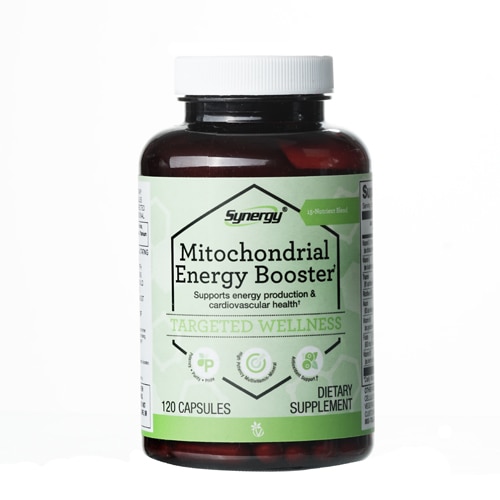[vc_row][vc_column][vc_column_text]Mitochondria are having a moment. Wellness gurus emphasizing the importance of protecting mitochondrial function pop up frequently in our social media feeds and at health summits.
Why are so many health experts talking about mitochondria? What are mitochondria, and why should we care about them?

What are mitochondria?
You probably learned in your high school biology class that mitochondria function as the ‘powerhouse of the cells,’ places where the body’s energy is produced. Mitochondria use oxygen and nutrients from the food we eat to create energy in nearly every cell in the human body.
Different cell types have different types of mitochondria, so the mitochondria in the brain differ from those in the liver or heart, for example. We each have trillions of mitochondria, and they communicate with each other across different parts of the body.
While their role in producing energy isn’t disputed, recent research has revealed that mitochondria do a lot more than power our cells. Research suggests that
mitochondria play key roles in numerous bodily processes, including hormone production, the immune response and cell death and cleanup. They’re involved in so many cellular processes that researchers believe their
dysfunction may be implicated in heart disease, neurological disorders, diabetes and psychological issues.
As producers of your cells’ energy, if your mitochondria aren’t functioning well, you’ll likely have less energy overall. Perhaps more importantly, because of their critical roles in cellular function, research suggests that mitochondrial dysfunction can affect neurologic, cardiovascular and metabolic diseases, as well as the pace of aging.
What harms mitochondrial function?
Several lifestyle factors can influence your mitochondria’s health for better or worse.
According to
Mark Tarnopolsky, Professor and Division Head of Neuromuscular and Neurometabolic Disorders at McMaster University, the things most damaging to mitochondrial function are smoking, poor sleep and a sedentary lifestyle.
“Cigarette smoking is probably the number one culprit that’s going to knock down mitochondrial function,” he says. Carbon monoxide and nicotine poison mitochondria, he explains, so both cigarettes and vaping can impair their health.
Mitochondria also suffer when we get insufficient or poor quality sleep, Tarnopolsky reports, as deep sleep is vital to healthy mitochondrial function. Research suggests that
autophagy – the process of cleaning up damaged mitochondria – happens during deep sleep, and when we don’t sleep enough or don’t reach those deeper stages of sleep, the health of our mitochondria declines.
Not moving enough also negatively affects our mitochondria. “Having a very sedentary lifestyle ultimately is not good for your mitochondria,” he cautions. He’s found that those who exercise regularly have more and healthier mitochondria than their sedentary counterparts.
Recent research also points to the effect our emotions may have on our mitochondria. One study measuring mood in the evening and markers of mitochondrial activity on the following day suggested that
positive moods promote better mitochondrial health than negative ones.
Researchers exploring the connection between mitochondria and mental health call out stress, toxins and poor dietary choices as especially detrimental to mitochondrial health. One study found that common
pesticides damage mitochondria as can many
other environmental contaminants.
Even if we carefully avoid these potentially damaging things, the natural aging process isn’t so easily sidestepped.
As we age, we invariably lose mitochondria, and the ones we have tend to function less effectively.
However, we can mitigate those losses with lifestyle choices that support mitochondrial health, which can help us
live healthier longer.
Enhancing mitochondrial function
Some of the best things we can do for our mitochondria are the same things you’ve heard about that help
manage glucose, boost
metabolism and increase
healthspan.
Get physical
Tarnopolsky singles out
exercise as the most protective thing you can do for your mitochondria. “I think the best thing people can do to enhance their mitochondria,” he says, “is to perform regular exercise. Anything that gets your heart rate up to somewhere around 120 to 150 beats per minute for 30 minutes or longer three or four times per week is usually going to significantly improve your mitochondria.”
It doesn’t take long for regular exercise to make a marked difference in mitochondrial health, he explains. “After only three months we see almost a doubling of the number of mitochondria in the muscle. It’s probably the most potent way that we can increase our mitochondrial mass in our muscle and the number one thing people can do to both increase their mitochondria and also maintain it as we age.”
Tarnopolsky notes that shorter bursts of
higher intensity exercise can have similar beneficial effects, but he recognizes that in general people are less likely to keep up those activities long term than something enjoyable like brisk walks with friends or other moderate intensity activities. Finding something you can sustain is key to protecting mitochondrial health.
Even if you’ve generally been pretty sedentary, according to Tarnopolsky, “It’s never too late to start. We’ve done studies in older adults who have been largely sedentary their whole life. With endurance as well as resistance exercise, within three months we can see substantial improvements.”
In addition to increasing mitochondrial function in muscle tissue, he says, exercise also appears to enhance
mitochondrial health in the brain.
He recommends the combination of endurance exercise and
resistance training as “the ideal way to improve your healthspan and functional capacity.”
Prioritize sleep
Making sleep a priority is a critical way to support mitochondrial function, as researchers believe that we
repair our mitochondria during deep sleep. Compromised mitochondrial repair may be why poor sleep has been linked to
cognitive decline,
cardiovascular problems and accelerated aging.
If your sleep could use some improvement, focus on your
sleep hygiene:
- Keep a consistent sleep schedule
- Create a relaxing bedtime routine
- Avoid caffeine after noon
- Get outside in the morning
- Skip screens at bedtime
Mitochondria throughout the body appear to be sensitive to light, and because they are involved with
regulating circadian rhythm, paying attention to your light exposure could help both your sleep and your mitochondrial functioning.
Try to avoid blue light at the end of the day, use
light-blocking curtains in your bedroom and avoid screens at bedtime to improve both sleep quality and mitochondrial health.
Manage stress
You probably already know that
stress has multiple negative impacts on health, many of which may be tied to the way stress affects mitochondria. Several studies have noted that
stress alters mitochondrial function, which can have numerous downstream consequences.
Other psychological states also affect mitochondrial function and vice versa. Studies suggest that n
egative moods impair mitochondrial health, while malfunctioning mitochondria have been
implicated in mood disorders. Seeking out
mood-boosting activities may not only make you feel happier, it may benefit your mitochondria.
Give your mitochondria a multipronged boost by managing stress with
exercise, which improves mood and mitochondrial function at the same time. Take your exercise outdoors for the additional
benefits of sunlight, which provides a mood-boost and can directly affect mitochondrial health as well.
See red
Emerging research suggests that our predominantly indoor lives together with the switch to LED light bulbs may be having some unforeseen consequences on the health of our mitochondria.
Glen Jeffery, a Professor of Neuroscience at University College London investigating the effect of light on mitochondrial health, reports that research has revealed that “the wavelengths present in LEDs disrupt mitochondria and reduce mitochondrial function.”
The average person spends ninety percent or more of their time in buildings lit with LEDs and fluorescent bulbs. Coupled with modern windows that block infrared light from the sun, Jeffery says, “You are starved of infrared light and your mitochondria are super unhappy.” He explains: “Life has evolved for billions of years under sunlight with a fixed balance between blue and red in it. It’s just recently that after billions of years of evolution – bang! – we changed it, we’ve taken all the red light away.” Researchers believe this lack of exposure to red wavelengths plays an important role in diseases related to metabolic health, such as diabetes and obesity.
However, Jeffery points out, some very simple interventions can help counteract the effects of modern lighting and the
blue light from our electronics. “Just a walk in the park at lunchtime will make a difference. It doesn’t matter if it’s cloudy or clear, you’ll get the same amount of infrared light.”
Additionally, he recommends setting up a lamp with an incandescent bulb – which emits the red wavelengths missing from LEDs – where you spend much of your time. He cautions that many of the products sold for home
red light therapy generally don’t emit the beneficial wavelengths our mitochondria need.
Try intermittent fasting
Having too much energy available has been found to have a negative effect on mitochondria when studied in cultured cells. In the human body, mitochondria will have too much energy available when we overeat. Experts recommend only eating when you’re hungry and considering
intermittent fasting, which can mean simply shortening the window during which you consume food. If you currently snack after dinner, closing the kitchen earlier at night can make it easier to have the consistent 12-hour fast that experts say is a minimum to strive for.
Amp up antioxidants
We’ve heard often about the benefits of a diet high in
antioxidants. Perhaps many of these benefits derive from antioxidants’ ability to protect mitochondria by neutralizing free radicals.
Some of the foods thought to be most beneficial to mitochondrial function include:
Soybeans. Soybeans contain a compound called genistein, which researchers have found may exert a
positive influence on mitochondrial health.
†
Cacao. Studies of cacao have found it contains
compounds that enhance mitochondrial health. Enjoy
cacao in delicious hot drinks and
sweet-but-healthy treats.
†
Resveratrol. The celebrated compound found in red grapes,
resveratrol has also been studied for its
beneficial effects on mitochondria.
†
Nitrate-rich vegetables. Research suggests nitrate compounds – like those found in
beets and
leafy greens –
influence mitochondrial proteins and may
increase mitochondrial function.
†
Amla. Also known as Indian gooseberry,
amla is exceptionally rich in antioxidants and has shown promise for
supporting mitochondrial abundance.
†
Tarnopolsky cautions that more antioxidants aren’t necessarily better. Some research has found that combining well-known antioxidants can have the opposite of the intended effect, functioning as pro-oxidants when taken together. He warns, “If you haven’t tested a specific combination in humans, you actually don’t know it’s functioning as an antioxidant.” He says it’s less of a concern if you’re eating whole foods rich in antioxidants than taking large doses of antioxidant supplements.
Want your mitochondria to enhance your energy and increase your healthspan? Attend to the fundamentals of a healthy lifestyle: Get plenty of
exercise and quality sleep, eat a varied, whole-foods diet, spend time outdoors and manage stress to help your mitochondria function at their best.
†These statements have not been approved by the Food and Drug Administration. These products are not intended to diagnose, treat, cure or prevent disease.[/vc_column_text][/vc_column][/vc_row][vc_row][vc_column][vc_text_separator title="Featured Products" border_width="2"][vc_row_inner equal_height="yes" content_placement="middle" gap="35"][vc_column_inner width="1/3"][vc_single_image image="182774" img_size="full" alignment="center" onclick="custom_link" img_link_target="_blank" css=".vc_custom_1740852165050{padding-right: 7% !important;padding-left: 7% !important;}" link="https://www.vitacost.com/life-extension-geroprotect-ageless-cell"][/vc_column_inner][vc_column_inner width="1/3"][vc_single_image image="182776" img_size="full" alignment="center" onclick="custom_link" img_link_target="_blank" css=".vc_custom_1740852182244{padding-right: 7% !important;padding-left: 7% !important;}" link="https://www.vitacost.com/vitacost-synergy-mitochondrial-energy-booster-15-nutrient-blend"][/vc_column_inner][vc_column_inner width="1/3"][vc_single_image image="182775" img_size="full" alignment="center" onclick="custom_link" img_link_target="_blank" css=".vc_custom_1740852202931{padding-right: 7% !important;padding-left: 7% !important;}" link="https://www.vitacost.com/life-extension-mitochondrial-basics-with-pqq"][/vc_column_inner][/vc_row_inner][/vc_column][/vc_row]





